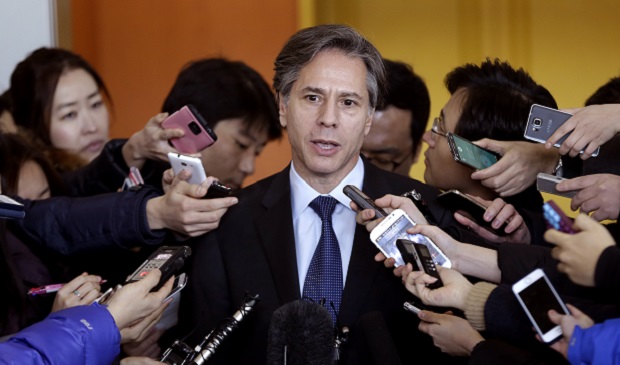
U.S. Deputy Secretary of State Antony Blinken speaks to the media after meeting with his South Korean counterpart Cho Tae-yong at the Foreign Ministry in Seoul, South Korea, Monday, Feb. 9, 2015. Blinken arrived in South Korea Sunday to discuss North Korea’s nuclear issue and the South Korea and the United States alliance. AP
SEOUL — New US Deputy Secretary of State Antony Blinken stressed the need to sustain sanctions pressure on Pyongyang as he held talks Monday in Seoul that focused on North Korea’s nuclear and missile programs.
Blinken’s arrival in South Korea was presaged by a series of North Korean missile tests, reflecting escalating military tensions on the divided peninsula ahead of large-scale US-South Korea military drills next month.
Following talks with his South Korean counterpart Cho Tae-Yong, Blinken argued that international sanctions on North Korea had made a “meaningful difference” to its ability to acquire materials for its weapons and missiles programs.
North Korea is already subject to a raft of US and UN sanctions over its arms program, but some critics insist the measures have failed to stop Pyongyang pushing ahead with its nuclear and missile development.
President Barack Obama imposed fresh sanctions last month following a damaging cyber attack on Hollywood studio Sony Pictures that Washington blamed on Pyongyang.
And US lawmakers introduced legislation last week that would widen sanctions by imposing harsher penalties on foreign companies doing business with Pyongyang.
Kicking off a three-nation tour that will also take him to China and Japan, Blinken said the US was still open to negotiating with the North, but only if it showed a tangible commitment to denuclearization.
“And until the North Koreans demonstrate that they are serious, it is important to sustain the pressure on them,” he said.
The North test-fired five short-range missiles into the sea as Blinken arrived in Seoul on Sunday, and the day before it had trumpeted the test of a new “ultra-precision” anti-ship cruise missile under the watchful eye of leader Kim Jong-Un.
North Korea often test-fires missiles and rockets to coincide with high-profile visits to the rival South, and at times of military tension.
Next month sees the launch of annual joint exercises by the US and South Korean military, which regularly see North-South relations go into a vertiginous tail-spin.
Pyongyang views the drills as provocative rehearsals for invasion, while Seoul and Washington insist they are defensive in nature.
Last month, North Korea had offered to suspend any further nuclear test if this year’s joint exercises were cancelled — a proposal the US State Department described as a “non-starter.”
North Korea has conducted three nuclear tests — most recently in February 2013 — and its moratorium offer was seen in Washington as an “implicit threat” to carry out a fourth.
Last week, the North’s top military body ruled out resuming dialogue with the “gangster-like” United States, and vowed to respond to any US aggression with nuclear strikes and cyber warfare.
RELATED STORY
North Korea test-fires new anti-ship cruise missile